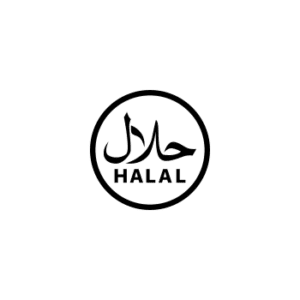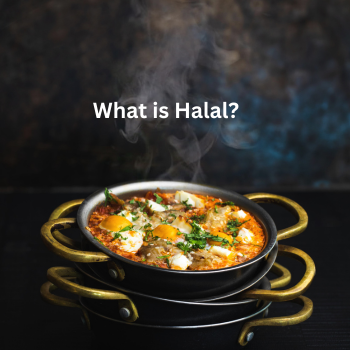What is Halal? Should I eat Halal food only? Is halal only meat? Know all about what is halal in this article!
It is important for us to have knowledge of different cultural practices and dietary restrictions. One such very important practice is Halal.
What is Halal?
Halal is an Arabic word that means “permissible” in English. According to Islamic dietary rules, halal is a term that includes food, drinks, and other items that are allowed to be consumed. The term halal not only includes the ingredients used in the cooking of food but also refers to the complete production, sourcing, and handling process.

The Significance of Halal:
Halal is very important to all Muslims in the world, both culturally and religiously. It also plays an important role in living a pure and moral lifestyle and practicing Islam. Muslims are obeying Allah’s directives and pursuing spiritual purity by following halal regulations. Muslims stay connected to their religion and maintain Islamic beliefs in their lives with the help of Halal practices.
What is Halal Dietary Guideline?
Strict dietary limitations and regulations for consuming food are included in Halal dietary rules. Alcohol, pork, and products related to them are haram in Islam and are prohibited for Muslims to consume. Also, the meat of animals that are not slaughtered according to Islamic rules is not allowed for Muslims to eat. The ethical treatment of animals, including their care and humane killing, is emphasized in halal regulations as well. The purpose is to promote compassion for animals while promoting a balanced, healthy lifestyle.
What is Halal Certification Process
A strict certification procedure is in place to guarantee the authenticity and conformity of Halal items. In most nations with a Muslim majority, certification for halal food is granted by legal authorities. In other nations, businesses freely get it, and non-governmental organizations issue it in exchange for an annual fee. Because of these certifications, consumers feel confident that the products they buy are genuinely halal.
What are Halal and Non-Halal Ingredients
While some ingredients are clearly Haram, such as alcohol and pork. It is sometimes difficult to distinguish between halal and haram ingredients, such as additives and ingredients produced by animals, which may raise concern about their halal status. Halal certification authorities are very careful in the examination of the sources and processes used in the production of these ingredients to determine their conformity to halal guidelines.
What is halal in Everyday Life
A halal lifestyle may involve not just food and nutrition but also travel, money, clothes, media, and cosmetics. A halal lifestyle also includes professional activities like supply chains and logistics for manufacturing and industries. Halal regulations not only include foods and beverages, but also it is also important for Muslims to know about the products they use in their daily lives, such as cosmetics and personal care items, and that these should be according to halal regulations. Because of this, Muslims live their lives according to halal rules.
Common Misconceptions About Halal
There are many misconceptions about Halal. Many people think that halal food is only for Muslims and non-Muslims cannot consume it, but this is not the truth; halal food is for everyone, whether you are a Muslim or a non-Muslim. Many non-Muslims consume halal food because they know that it is of high quality and pure. Another misconception is that halal food has no flavor or variety; this is also wrong because halal food has a wide range of mouthwatering choices from many cultural traditions.
Read about the health benefits of Greek yogurt in our article: health benefits of Greek yogurt: nutritious superfood.
Halal in the Global Market
The halal market has grown and expanded greatly. Not only in the Islamic nations, but halal items are now easily available all around the world. As the population of Muslims increases all around the world and the desire for high-quality, ethical goods rises, this is the main reason for the expansion of the halal market. To satisfy the demands of customers from all backgrounds, businesses, and industries realize that providing halal products is crucial.
Conclusion
In conclusion, the idea of halal goes beyond religious limitations. For Muslims, it stands for a way of living and signifies moral behavior. Muslims must follow Islamic regulations to lead their lives according to Allah’s command. We may promote cultural awareness and respect by knowing halal and its limits. Learning about halal may enhance your understanding of the variety in the world, whether you are a Muslim or are just interested in other cultures.
Frequently Asked Questions:
- What makes something halal?
Something is halal if it complies with Islamic law (Shariah). It must be free of prohibited substances (like alcohol or pork), ethically sourced, and prepared in a manner that aligns with Islamic guidelines. For meat, animals must be slaughtered while invoking the name of Allah. - What is meant by halal food?
Halal food refers to items permissible under Islamic dietary laws. It excludes pork, alcohol, and improperly slaughtered animals. Foods must be clean, pure, and ethically sourced to meet these religious standards. - What are the rules of halal?
Halal rules prohibit consumption of alcohol, pork, carrion, and improperly slaughtered animals. Meat must be from permissible species and slaughtered with the name of Allah invoked. Food must also be free from contamination by haram substances. - What is the difference between halal and regular meat?
Halal meat is slaughtered according to Islamic guidelines, with prayers offered and blood drained. Regular meat may not follow these religious steps. Additionally, halal excludes animals not allowed in Islam, like pigs. - Why is pork not halal?
Pork is considered impure and prohibited in Islam because it is explicitly forbidden in the Quran. Muslims believe avoiding pork preserves spiritual and physical purity. - Is sugar halal or haram?
Sugar is generally halal as long as it is processed without alcohol or other haram substances. Most commercially available sugar complies with halal guidelines, but certain additives or processing methods should be checked.



